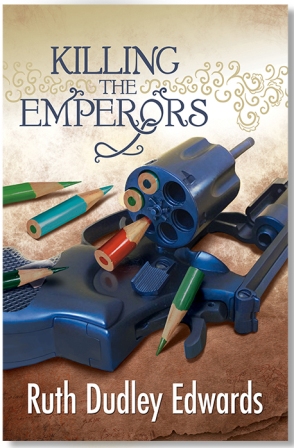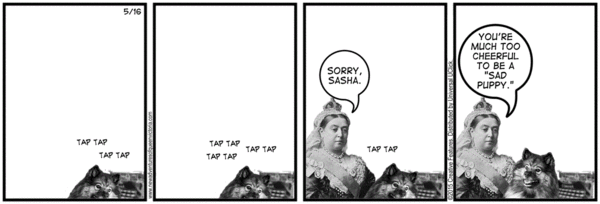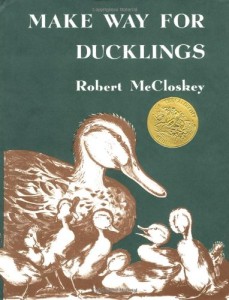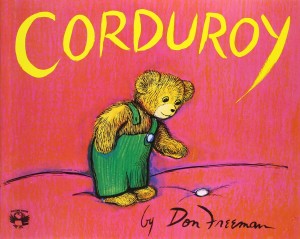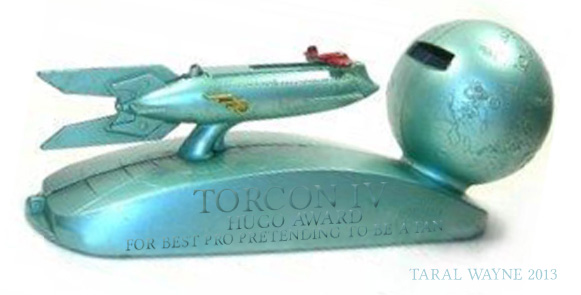aka If All Puppies Were Brothers, Would You Let One Marry Your Sister?
Here in today’s roundup: Martin Wisse, Sarah A. Hoyt, Alexandra Erin, Lela E. Buis, Bruce Baugh, Adam-Troy Castro, Vox Day, Daddy Warpig, Phil Sandifer, Shaun Duke, Spacefaring Kitten, Rebekah Golden, Dave Noonan, Lis Carey, Aziz Poonawalla, Charlie Jane Anders, Natalie Luhrs, and Kyra. (Title credit belongs to File 770 contributing editors of the day Jim Henley and May Tree – who independently submitted the same item — and Owlmirror.)
Martin Wisse on Wis[s]e Words
“Your writer’s group would not be angry with this” – May 29
That’s the sort of bollocks you hear a lot of science fiction readers talk about, that they want prose that’s transparent, “doesn’t get in the way of the story”, doesn’t demand any attention paid, doesn’t challenge. There’s of course a huge inferiority complex running through parts of science fiction, resulting in the dismissal of everything that smacks of the literary and difficult. That’s what you see here. It’s not bad persé, it’s just a bit unambitious.
And to be honest, the Hugos too often have been that already. There are plenty of middle of the road novels that have been nominated and won it. Do we really need more of that, or do we rather have something a bit more challenging? Cetainly the Puppy nominees aren’t the answers: by all reports they mostly fail even Paulk’s rather low standards.
Sarah A. Hoyt on According To Hoyt
“Pure Gold” – May 29
We know the air of collegiate comradery is a lie, to an extent. Note I said to an extent, and I’ll explain later.
Part of my amusement at the reaction to the whole Sad Puppies thing has been the very same people saying there were never politics in SF being the very same people who once told me that there were rifts I didn’t see in the field and that some people in the early two thousands still didn’t talk to each after arguments over the Vietnam war back in the day.
And anyone who has read Heinlein’s bio knows about the other rifts in fandom and among professionals way back before that, a lot of them political.
But this is to an extent, because to another extent… Well, guys, we’re all pretty weird. We spend our days writing about worlds and futures that don’t exist.
Older son who aspires to medicine (and is engaged in preparation to practice it) tells me that only people with a compulsion to work at healing (and he says it’s a compulsion) understand other people with the same issue. Well, guys… Yeah, same for writers, and to an extent for fans.
I’m not going to tell you that I love all my colleagues. There are many I loathe, many I cordially detest, many I tolerate, and, yes, many I love dearly. Weirdly, this doesn’t rift across political lines (of course, my politics being what they are, they are at best cross-sectional to real world politics) or even correlate to those I like to read. Yeah, curse it, some of the ones I loathe write pretty good stuff. (Shakes fist at great novelist in the sky, who has a sense of humor.)
Alexandra Erin on Blue Author Is About To Write
“The Puppies come so close to getting it, so often.” – May 28
…I stumbled across a post by Dave Freer from February called “To Serve One Master — The Reader“.
The major thrust of the blog post is the idea that however an author intends a work to be received is secondary to how readers receive it, which… okay. This is something that it’s taken me a long time to accept as an author, but I have to say that I am in general agreement with it.
The thing is, it’s weird to see a self-professed Puppy saying this. After all, these are the same people who, whenever someone starts talking about the racist or sexist content of a work, respond with “BUT THAT’S NOT WHAT THE AUTHOR MEANT! YOU CAN’T KNOW WHAT’S IN THEIR HEARTS AND MINDS! YOU’RE JUST READING INTO THINGS!”
Lela E. Buis
“Puppy Debate Maxing Out” – May 29
I’ve been involved in work-for-hire for the last couple of weeks, and am just coming up for air. Checking around my virtual environment, I notice the debate about the Hugo’s seems to have gone past the point of raging insults and into slash and burn territory.
This is a process that’s encouraged by the nature of the Internet itself. If this were a space opera, for example, the plot would play out something like this: The Puppies make a raid and take over territory at the Hugo Awards. Because this is considered an aggressive action, defenders of the award would assemble a force to shake them loose. They’d all let fly with photon torpedoes and phaser cannons set to “kill.” If the forces had to resort to hand-to-hand combat, they might bring out their light sabers and go at it in Star Wars style. The result would either be that the Puppies are driven off, or else they prevail and put down roots in their new territory.
The problem with this scenario, of course, is that all the battles are actually virtual. They’re being fought on blogs, websites, Twitter and Amazon accounts and in a few news outlets. This means that there can be no really decisive victory. Defenders of the Hugos can score against the other side with a well-turned phrase, but not really take back the stronghold.
Bruce Baugh on Google Plus – May 28
Kate Paulk will be organizing the Sad Puppies 4 effort for next year’s Hugos, so it’s interesting to see what her creative priorities are. Two things of note, for me…
#1. Her guideline #7, “The prose is invisible.”, seems like a good way to toss out some of sf/f’s best writers, including Vance, Wolfe, Lafferty, and so many others.This line from Jack Vance’s “The Last Castle”, for instance, is delightful and very much visible: “In the end, death came uniformly to all, and all extracted as much satisfaction from their dying as this essentially graceless process could afford.” Prose I stop to admire in delight, or wonder, or the kind of bewilderment that leads to insight is a big part of why I read, and always has been.
#2. There’s nothing on her list about world-building, at all. This isn’t unique to this piece, either. None of the Puppies have much at all to say about world-building. I read sf/f for other places and times just as much for specific characters and stories within them, and one of the things that can make a work great is its setting. But seriously, they just don’t talk about world-building, which seems to me like talking about cooking shows and never wondering how something tastes.
Adam-Troy Castro on Facebook – May 29
…Even if you’re Eric Flint and write exactly the kind of fiction the Puppies like, if you think the Puppies have no case, if you write several blog posts addressing them with logic, if you criticize Brad Torgersen in particular, you are a CHORF guilty of Saul Alinsky tactics and should be subjected to demands for apology.
Can we just make a rule in life that if you invoke the name of an old lefty who has been dead for decades and who is in fact unknown to most people who harbor left-wing beliefs, to attack criticism for crying out loud, you are at best a silly silly person?
https://twitter.com/Daddy_Warpig/status/604141307326410752
https://twitter.com/PhilSandifer/status/604121945886580736
Vox Day on Vox Popoli
“The Olympian indifference of Johnny Con” – May 29
Mike Cernovich @Cernovich As a white straight male capitalist, I’m happy for @scalzi’s $3.4 million book deal. But how many women/POC are squeezed out because of it?
I had estimated 680 on the basis of other SF publishers’ current initial advances, but I stand corrected. …Tor is funding 13 more John Scalzi books at the opportunity cost of no less than 523 initial advances to new science fiction authors. As a side note, it is informative to see how much initial advances from major publishers have shrunk over time; the advance for my first published novel in 1996 was $20,000.
Those who have thrown hissy fits over Sad Puppies supposedly slate-blocking as many as 12 authors and preventing them from receiving recognition for their work at the Hugo Awards would do well to consider the fact that Patrick Nielsen Hayden and John Scalzi have combined to prevent more than 500 authors from getting published and receiving paid advances. Opportunity cost is a bitch, especially when you’re the one upon whose fingers the window of opportunity has closed.
Shaun Duke on World in a Satin Bag
“On the Hugo Awards: Two Scholarly-ish Projects to Come (An Announcement)” – May 29
A lot of us in SF/F circles heard of the rumors circulating about the Hugos in the weeks prior to their announcement. I heard many rumors from some of my friends, and many more circulated (or were revealed as truth) through RP/SP circles and through those with far more industry clout than myself. Since last year’s Hugo Awards were also controversial, I had the feeling that these rumors were going to indicate a blow-up that we hadn’t yet scene. And so I turned to a friend of mine for help: Aaron Beveridge.
Aaron is one of the co-creators of MassMine, along with Nicholas Van Horn. MassMine was created with the intent of helping academics acquire meaningful data from social media platforms (specifically, Twitter). Their program is pretty complicated, so I’ll let you go to the website and learn all about it (there’s a video and everything!). Aaron, it turns out, is one of those enthusiastic individuals who believes, as I do, that collaboration is critical to academic work, and so it didn’t take any effort at all to convince him to help me collect data and put together the projects below.
This post serves as an official announcement for the projects that Aaron and I are working on. These include the following:
1. MassMine-ing the Hugo Awards: Social Media Reactions and What the Data Tell Us….
Spacefaring Kitten on Spacefaring, Extradimensional Happy Kittens
“’The Day the World Turned Upside Down’ by Thomas Olde Heuvelt” – May 29
I was pleased that a Lightspeed story made it. It’s a very good magazine that won the semiprozine Hugo last year, after all, and it has published some pretty awesome fiction in 2014 as well. I’m quite sure I nominated two stories from the magazine for the Hugos, plus the whole magazine in the semiprozine category, plus the editor John Joseph Adams in the editor category.
I don’t read absolutely everything LS publishes, though, and Olde Heuvelt’s story was new to me. Naturally, I had some great expectations. Too bad this story let them down.
Rebekah Golden
“2015 Hugo Awards Best Short Story: Reviewing Single Samurai” – May 29
It’s fairly obvious that Diamond had a vivid image of this story in his head, the problem is that at the end I did not. I think some of this is related to the fact that Diamond so utterly identified with the character he was writing that he did not see the foibles of the character’s personality.
Dave Noonan
“2015 Hugo Semi Pro Zine” – May 29
Wow! A whole category with no Puppy Shit smeared all over it. I didn’t intend to read these because I did want to read more shitty short stories. So Beneath Ceaseless Skies sat open in my Moon+ for a couple of days before I started reading and then… shock! The first story was good! The second story is good too! Holy crap. So I went looking and discovered the Puppies apparently couldn’t find any right-wing nutjob Semi Pro Zines so I may actually get to read some decent stuff. Finger’s crossed.
Dave Noonan
“2015 Hugo Fanzine” – May 29
My notes and rankings for the Best Fanzine category of the 2015 Hugo Awards.
- Journey Planet
- Tangent Online
- The Revenge of Hump Day
Adult Onset Atheist
“SNARL: Best Dramatic Presentation, Long Form” – May 29
I watched all of these movies before I saw them on the Hugo nominations list. They are all good movies, and worth a bit of hard earned down-time to watch. I get to review them without reflexively asking “Would anybody want to watch/read this?”, and get down to the more important business of defining my own personal opinion. All good reviews are subjective because they arise in part from the reviewer’s enjoyment of the subject, and resonate with the reviewer’s reasons for picking up the subject of the review to begin with.
Lis Carey on Lis Carey’s Library
“The Zombie Nation, by Carter Reid” – May 29
A complete loss, in my opinion.
Aziz Poonawalla on Beliefnet
“G. Willow Wilson’s Ms. Marvel nominated for Hugo Award — and needs YOUR support” – May 29
In 2013, Saladin Ahmed’s book Throne of the Crescent Moon was nominated for Best Novel, losing out to John Scalzi’s Redshirts – a tough loss indeed, but a significant honor in its own right. And way back in 1980, Steven Barnes’s The Locusts (co-written with Larry Niven) was nominated for Best Novelette, losing out to George R.R. Martin. There may be other Muslims whose works were nominated that I am overlooking, but to the best of my knowledge no Muslim has ever taken home the iconic Huge Rocket statue.
This year, however, that all could change: Ms. Marvel Volume 1: No Normal, written by G. Willow Wilson, is nominated for Best Graphic Story. This is huge news and a tremendous recognition by the SF/F community of the cultural, literary, and social impact of Ms. Marvel – which is almost impossible to summarize, but this article at the venerable AV Club magazine is a pretty good primer: “One year later, Ms. Marvel’s influence is felt far beyond the comics page”
Charlie Jane Anders on io9
“Someone Will Livetweet Vox Day’s Debut Novel For Charity” – May 29
Before Theodore “Vox Day” Beale was the central figure in the Sad/Rabid Puppies Hugo Awards hacking, he wrote a series of religious-inspired fantasy novels for Pocket Books. And blogger Natalie Luhrs is going to live-tweet his debut novel, Eternal Warriors: The War in Heaven, for charity….
[Update: In case it’s not clear, she will livetweet her reaction to the book, one page per tweet, not the actual text of the book.]
Natalie Luhrs on Pretty Terrible
“Bad Life Decisions: Make Me Read Theodore Beale” – May 29
So you can help me raise some money for RAINN (or a charity in your country which does the same sort of work). For every $5 donated to RAINN, I will read and live tweet one page of this 399 page delight with the hashtag #readingVD. I’ll also re-publish the tweets and add additional commentary by chapter here at Pretty Terrible–those’ll go up as I finish each chapter (there are 29 chapters in the book, as well as a prologue and an author’s note).
However, I’m not going to read any of it until we’ve raised at least $500–and I’d like to raise that by June 11. If we manage to raise $2,000 I will read the entirety of Theodore Beale’s Eternal Warriors™: The War in Heaven™.
Alexandra Erin on Blue Author Is About To Write
“Rabid Puppies Review Books: HAROLD AND THE PURPLE CRAYON” – May 29
Reviewed By Special Guest Reviewer Theophilus Pratt (Publisher — Hymenaeus House)
This instructive tale tells of a young man who all by himself creates a road which he then travels down, makes a mountain which he climbs, then saves himself from falling by conjuring a balloon which he hangs onto until he can bring into being a basket capable of supporting himself. His boundless creativity allows him to shape a whole civilization of buildings until, amusingly, he re-creates the very house he started out from and sleeps the sleep of the just, knowing that everything he has in life was fashioned by his own hand.
Amusingly, this book was sold to me as a work of fantasy when it is in fact the most realistic work of fiction I have ever encountered. If anything, it was too realistic to be fiction, a fact I found very amusing. Flipping through its pages proved to be instructive, as I began to see it was nothing more than a thinly veiled if amusing allegory for my own inimitable life.
Did I not provide myself with the only light I ever needed to walk by, as Harold did? Have I not always made my own road, and even left it when even it proved too stifling to my boundless intellect? Has not my dizzying intellectual magnitude taken me to the height of peaks so high that even I cannot long find purchase upon them? And when I fall, whom do I rely upon to prop myself up except myself?
Kyra in a comment on File 770 – May 29
Turning and turning in the widening blog
The puppy cannot hear the puppeteer;
Things fall apart; the Hugos cannot hold;
Mere doggerel is loosed upon the fans,
The canine tide is loosed, and in Spokane
The ceremony of awards is drowned;
The fest lacks all conviction, while the trolls
Are full of passionate intensity.Surely some aggravation is at hand;
Surely the Slated Hugos are at hand.
The Slated Hugos! Hardly are those words out
When a vast image of a nominee story
Troubles my sight: a waste of desert prose;
A text with turgid body and an end wholly bland,
A phrase blank and meaningless about guns,
Is moving its dull verbs, while all about it
Wind shadows of the indignant reviewers’ words.The darkness drops again but now I know
That sixteen nominees in fiction slots
Were read like nightmares in my shaking Kindle,
And what rough book, its hour come round at last,
Slouches towards Sasquan for its award?


